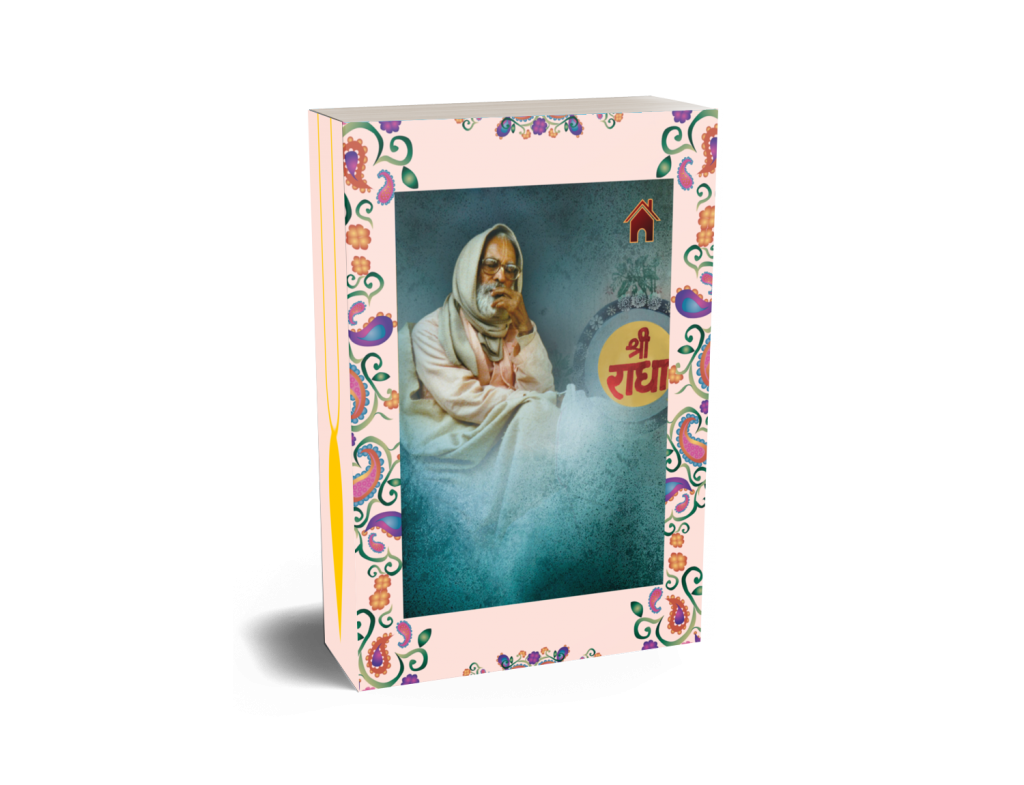

Chapter 9 from the book, Going Beyond Vaikuṇṭha, 4th edition by Śrīla Bhaktivedānta Nārāyaṇa Mahārāja
Gopa-kumāra was somewhat dissatisfied with Vaikuṇṭha – that Vaikuṇṭha which is so desirable, where very, very 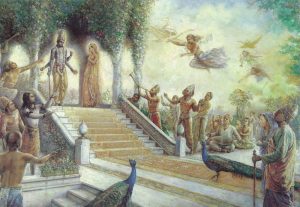 beautiful bhakti is going on, and which is so difficult to attain. When Gopa-kumāra arrived there, Nārāyaṇa engaged him in the service of fanning Him with a cāmara. Sometimes He even displayed the form of Gopāla and the līlā of taking the cows out to graze and other pastimes also, but still Gopa-kumāra was not happy there.
beautiful bhakti is going on, and which is so difficult to attain. When Gopa-kumāra arrived there, Nārāyaṇa engaged him in the service of fanning Him with a cāmara. Sometimes He even displayed the form of Gopāla and the līlā of taking the cows out to graze and other pastimes also, but still Gopa-kumāra was not happy there.
I knew of one man who from childhood was hankering to go to Vṛndāvana from his residence in the state of Bihar. He was thinking, “When will I be able to go to Vṛndāvana? There I will bathe in the Yamunā, I will roll in the kuñjas; sometimes I will go to Rādhā-kuṇḍa, and sometimes I will go to Śyāma-kuṇḍa.” After a very long time the opportunity finally arrived, and leaving everything behind, he went to Vṛndāvana and stayed for some time. At first, with great emotion he roamed in the four directions, smearing dust on himself and everything. Then after some time, something astonishing happened: gradually his ‘fever’ decreased. It is like a fever, isn’t it? “I will go to Vṛndāvana, I will go to Govardhana, I will go to Rādhā-kuṇḍa.” At first his fever had increased, and so he left everything and came to Vṛndāvana. He visited all the places of Kṛṣṇa’s pastimes and daily he visited numerous  temples and went on parikramā. Sometimes he would even do parikramā two or three times on the same day. He did whatever he was physically capable of doing, but then after some time the low tide of his fever came, and he didn’t perform any parikramā or visit any temples.
temples and went on parikramā. Sometimes he would even do parikramā two or three times on the same day. He did whatever he was physically capable of doing, but then after some time the low tide of his fever came, and he didn’t perform any parikramā or visit any temples.
Some come to Vṛndāvana and without understanding anything they say, “This is the fruit of one or two births’ sādhana, in Vṛndāvana?” But others come and see that Vṛndāvana is full of rasa, and upon residing here for a short time, they become overwhelmed with bhāva. But for those who are newcomers and don’t have such internal development, what will they see in the dust and stone of Vṛndāvana? Everything they come across will only disturb their minds, and this will be their darśana of Vṛndāvana.
But Gopa-kumāra’s mind was disturbed in Vaikuṇṭha for a different reason. In his heart there was some ardent desire; intense spiritual greed produces this type of ardent desire. And how did it come? For millions of years he had been practising sādhana: he had been to Brahmaloka and many other worlds and back again, and millions of years had elapsed. His ardent desire didn’t come after only one day; it came only after performing bhajana by way of the gopāla-mantra, like the method of Brahmā. In our sampradāya it is one of the main mantras, yet still he was not feeling completely fulfilled.
Vaikuṇṭha is the pinnacle attained by vaidhī-bhakti and is not minimised in our scriptures. Up to the Ninth Canto 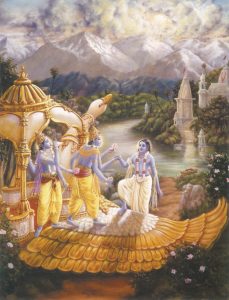 of Śrīmad-Bhāgavatam it is said to be the highest destination. Where was Ajāmila taken? What was the destination of Prahlāda? Vaikuṇṭha. And what was the destination of Dhruva? Dhruvaloka, meaning one extended part of Vaikuṇṭha. Therefore it has been stated that there is no higher place to be attained by performing bhakti. Although in one or two places in the scriptures we find the glories of Goloka Vraja described, they have been described so briefly that an ordinary person will not understand Goloka’s true value; only one who can extract the essence will see, not everyone. Obtaining residence there is extremely rare, and within Gopa-kumāra’s heart is that rare desire for darśana of Gopāla. Along with that he desires kṛṣṇa-prema that is unrestricted like a horse with no reins.
of Śrīmad-Bhāgavatam it is said to be the highest destination. Where was Ajāmila taken? What was the destination of Prahlāda? Vaikuṇṭha. And what was the destination of Dhruva? Dhruvaloka, meaning one extended part of Vaikuṇṭha. Therefore it has been stated that there is no higher place to be attained by performing bhakti. Although in one or two places in the scriptures we find the glories of Goloka Vraja described, they have been described so briefly that an ordinary person will not understand Goloka’s true value; only one who can extract the essence will see, not everyone. Obtaining residence there is extremely rare, and within Gopa-kumāra’s heart is that rare desire for darśana of Gopāla. Along with that he desires kṛṣṇa-prema that is unrestricted like a horse with no reins.
What is unrestricted prema? The members of Śrīmatī Rādhikā’s family bound Her inside the house, and the other gopīs were also bound inside their homes. “If you go to meet Kṛṣṇa we will punish you! Serve your husband or we will beat you! And we will spread your bad name everywhere!” Prema with fear of worldly reaction due to having failed to uphold one’s dharma is restricted love; but the gopīs left their husbands regardless to be with Kṛṣṇa. Their prema was not bound; rather it was fully manifested, and it even increased further. Many obstacles will come, yet prema will surely cross over them and heighten one’s desire to meet Kṛṣṇa. Therefore so many people were given obstacles, their desire for meeting Kṛṣṇa increased, and they finally met Him. Where there is a mood of awe and reverence (aiśvarya-bhāva), there is no place for such prema. If Bhagavān manifests His nature as the Supreme, He will not freely converse with any ladies and He will not approach any young, unmarried girl. Would Rāmacandra even look upon the face of an unmarried girl? Would Śrī Caitanya 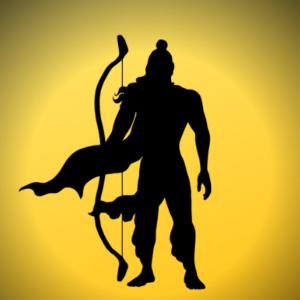 Mahāprabhu after He accepted sannyāsa? What to speak of not noting what ornaments they would be wearing around their necks or on their wrists, Mahāprabhu would not even look at the nails of their toes! Although They are Bhagavān, still They possess such shyness and dharmajña, constant awareness of upholding Their dharma.
Mahāprabhu after He accepted sannyāsa? What to speak of not noting what ornaments they would be wearing around their necks or on their wrists, Mahāprabhu would not even look at the nails of their toes! Although They are Bhagavān, still They possess such shyness and dharmajña, constant awareness of upholding Their dharma.
Where there is such a sentiment, prema is restricted, but this obstacle is due to the nature of one’s own worshipful Lord. Obstacles imposed by others are not enough to be a problem. All such obstacles were placed before Gopa-kumāra. In Vaikuṇṭha, the residents teased him: “You keep saying ‘Gopāla, Gopāla, Kṛṣṇa,’ and you say that while holding a piece of bamboo stick Kṛṣṇa will engage in the rāsa dance with the gopīs? This is a very shameful thing. Will Nārāyaṇa ever do this?” But this is not the problem, the obstacle. Then why is Gopa-kumāra dissatisfied? Nārada told him the reason. “In the form of Nārāyaṇa, He will not manifest the type of prema that you desire; He simply will not give it. You will not be able to laugh with Him, converse freely with Him – that is the big obstacle to prema here.”
Before, when Nārada Ṛṣi told Gopa-kumāra to remain in Vaikuṇṭha for some time, he wanted him to understand all of this tattva. Nārāyaṇa has a total of sixty qualities, five more than the demigods. Of these five, the first is His being hatāri-gati-dāyaka: He gives a high destination to those killed by His own hand. The second is that He possesses the highest pinnacle of all aiśvarya. The third is that He is the original seed of all different incarnations. The fourth is that He is the attractor of even the liberated souls, and the fifth is that He is eternally present in millions of universes. Therefore Nārāyaṇa is also Bhagavān and avatārī, the seed of all incarnations. Kṛṣṇa is also avatārī, so what is the difference between Them? When we say that Nārāyaṇa doesn’t come as an avatāra, we mean that His self-same form that is present in Vaikuṇṭha will not come to this world. Hayagrīva and other incarnations come, but Nārāyaṇa Himself – with a club, lotus flower, disc and conch shell in His four hands – comes in another form as someone’s son, husband, brother or friend, and then performs all His pastimes from those positions. And Kṛṣṇa? Bringing Vṛndāvana-dhāma with Him, He descends in His original form, playing the flute and enjoying with the gopīs. Bringing His dhāma and associates, He descends in His self-same form.
The Nārāyaṇa present at Badarī-Nārāyaṇa in the form of Nara and Nārāyaṇa is different from vaikuṇṭha-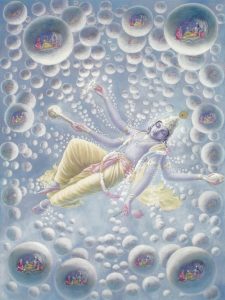 adhipati Nārāyaṇa, the master of Vaikuṇṭha. When Nārāyaṇa came here as Vāmana, Lakṣmī also came here, but it was Vāmana Nārāyaṇa that came here, and in Vaikuṇṭha-dhāma there was still vaikuṇṭha-adhipati Nārāyaṇa. Kāraṇodakaśāyī Viṣṇu, lying on Śeṣa, is also Nārāyaṇa, but His form and activities are different. The form and activities of the original Nārāyaṇa of Vaikuṇṭha are not brought to this world. Therefore it is said that there is no actual incarnation of Nārāyaṇa Himself. But in His original form as a kiśora, Kṛṣṇa descends bringing His associates, His līlā, and the entire sixty-four-square-mile Vraja-maṇḍala, which includes Rādhā-kuṇḍa, Śyāma-kuṇḍa, Girirāja-Govardhana, Nandagrāma and Varṣāṇā. This is His special characteristic; Nārāyaṇa doesn’t do this. This is Kṛṣṇa’s unique characteristic as the avatārī.
adhipati Nārāyaṇa, the master of Vaikuṇṭha. When Nārāyaṇa came here as Vāmana, Lakṣmī also came here, but it was Vāmana Nārāyaṇa that came here, and in Vaikuṇṭha-dhāma there was still vaikuṇṭha-adhipati Nārāyaṇa. Kāraṇodakaśāyī Viṣṇu, lying on Śeṣa, is also Nārāyaṇa, but His form and activities are different. The form and activities of the original Nārāyaṇa of Vaikuṇṭha are not brought to this world. Therefore it is said that there is no actual incarnation of Nārāyaṇa Himself. But in His original form as a kiśora, Kṛṣṇa descends bringing His associates, His līlā, and the entire sixty-four-square-mile Vraja-maṇḍala, which includes Rādhā-kuṇḍa, Śyāma-kuṇḍa, Girirāja-Govardhana, Nandagrāma and Varṣāṇā. This is His special characteristic; Nārāyaṇa doesn’t do this. This is Kṛṣṇa’s unique characteristic as the avatārī.
Bhagavān has so many forms, and all are hatāri-gati-dāyaka. What does that mean? Those demons and enemies who are personally killed by Him are given a high destination. Rāmacandra, Nṛsiṁha, Varāha, Paraśurāma and all other incarnations are hatāri-gati-dāyaka. The five qualities that are found in Bhagavān and not found in the demigods are found to the highest degree in Kṛṣṇa. In Nārāyaṇa and the incarnations these qualities are complete (pūrṇa), but in Kṛṣṇa they are most complete (pūrṇatama). When any incarnation from Nārāyaṇa up to Nṛsiṁha kills someone, what destination do They give to those They have killed? Sutala, Svarga, Brahmaloka, all kinds of destinations. And They will also give liberation, mukti, to some enemies killed by Them. According to how someone has approached Them, They will give a particular destination to that person.
For example, in rāma-līlā there was Śarbaṅga Ṛṣi, who was worshipping the impersonal brahma. He heard that Rāmacandra was coming, and thinking that Rāma was the personification of brahma, he waited for Him. After the sage waited for some time, Rāmacandra finally came and gave His darśana to him. Being very pleased, the sage said, “O Lord, give me my desired destination.” Then from the sage’s body a light came out, and that light entered the body of Rāmacandra and the sage attained liberation. He was such an unfortunate man: he received the direct darśana of Rāmacandra and he merely asked for liberation! Therefore Rāma will give liberation. Many incarnations will give it, but to those who approach Them as enemies, these incarnations will not give prema.
What is real liberation? According to Śrīmad-Bhāgavatam it is svarūpeṇa vyavasthitiḥ: that liberation which bestows service to the feet of Bhagavān, which is the highest destination. Those incarnations will not give this 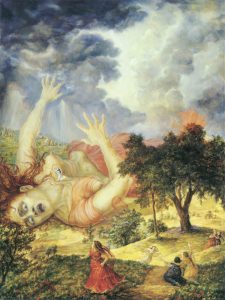 type of mukti. Especially They will not give it to those enemies whom They have killed. Nṛsiṁha killed Hiraṇyakaśipu, and Varāha killed Hiraṇyākṣa, yet neither of these demons obtained liberation in that birth. But Kṛṣṇa killed numerous demons and not only gave them liberation, to some He even gave prema! Like Pūtanā: she approached Kṛṣṇa in the guise of a mother, so He gave her a motherly position in Vraja. She didn’t directly become Kṛṣṇa’s mother; she was given a position in Goloka as an elderly dāsī, one who feeds Kṛṣṇa milk. Otherwise there would be a problem – she would be equal to Yaśodā, but that isn’t the case. She went to Goloka as a dāsī. This type of liberation Kṛṣṇa can give, and no other incarnation can give it.
type of mukti. Especially They will not give it to those enemies whom They have killed. Nṛsiṁha killed Hiraṇyakaśipu, and Varāha killed Hiraṇyākṣa, yet neither of these demons obtained liberation in that birth. But Kṛṣṇa killed numerous demons and not only gave them liberation, to some He even gave prema! Like Pūtanā: she approached Kṛṣṇa in the guise of a mother, so He gave her a motherly position in Vraja. She didn’t directly become Kṛṣṇa’s mother; she was given a position in Goloka as an elderly dāsī, one who feeds Kṛṣṇa milk. Otherwise there would be a problem – she would be equal to Yaśodā, but that isn’t the case. She went to Goloka as a dāsī. This type of liberation Kṛṣṇa can give, and no other incarnation can give it.
Those that are killed by Bhagavān are generally given ordinary destinations, but don’t think that He doesn’t give liberation as well. He can give liberation, and to devotees He gives prema. Citraketu Mahārāja didn’t desire liberation, and so he prayed:
na nāka-pṛṣṭhaṁ na ca pārameṣṭhyaṁ
na sārva-bhaumaṁ na rasādhipatyam
na yoga-siddhīr apunar-bhavaṁ vā
samañjasa tvā virahayya kāṅkṣe
Śrīmad-Bhāgavatam (6.11.25)
O Bhagavān, I do not desire to attain Dhruvaloka or Brahmaloka, nor do I desire to rule over the middle or lower planetary systems. I also do not desire the mystic perfections of yoga, nor liberation from the cycle of repeated birth and death if it means being separated from You.
Nṛsiṁhadeva offered liberation to Prahlāda Mahārāja, but Prahlāda didn’t desire it. In this way devotees don’t desire liberation, but if anyone wants it, Bhagavān can give it. And He gives prema to those who worship Him with a desire for it, like the royal princesses of Janakapura. They wanted Rāma to marry them and become their husband, so He showed them the path: “I can only accept one wife; therefore all of you will take birth in kṛṣṇa-līlā in the wombs of gopīs, and there your desires will be fulfilled.” Those great sages of Dandakaranya also first had to take birth as gopīs in Gokula; they were not sent directly to Goloka. Their identities as gopīs had not yet developed, so they had to first reside in the Vraja of this world for some time.
When a man takes a law course and passes the magistrate exams, will he then immediately become a judge? He will first have to undergo practical training by staying with an established judge for some time, and then he can become a judge himself. Similarly, going to the Vraja of this world, one will have to first undergo an apprenticeship, meaning that he must learn from someone, personally. For example, if a newly married girl goes 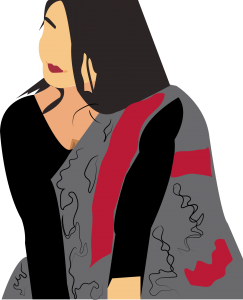 to the house of her mother-in-law and hasn’t yet learned how to cook, clean pots and serve food, then every day she will have to take abuse. But the members of the household will teach her everything. The mother-in-law will say, “My daughter, today my health is not so good. You do the cooking. Also, scrub the pots and sweep a little. I must rest, so you make some roṭīs like this….” Through such cleverness they will give her all practical instruction. In the same way, where will one receive this practical instruction to serve as a gopī? In the manifest pastimes of Bhagavān in Gokula Vraja, not at any other place. In a practical way, in the company of the eternally perfected devotees, for some time one will undergo an apprenticeship and learn. If one were sent directly to Goloka, then his identity would not yet be fully developed. Therefore it is necessary to first take birth in the manifest Vraja, and regardless of whether one will be in dāsya, sakhya, vātsalya or mādhurya, he must learn his duties there.
to the house of her mother-in-law and hasn’t yet learned how to cook, clean pots and serve food, then every day she will have to take abuse. But the members of the household will teach her everything. The mother-in-law will say, “My daughter, today my health is not so good. You do the cooking. Also, scrub the pots and sweep a little. I must rest, so you make some roṭīs like this….” Through such cleverness they will give her all practical instruction. In the same way, where will one receive this practical instruction to serve as a gopī? In the manifest pastimes of Bhagavān in Gokula Vraja, not at any other place. In a practical way, in the company of the eternally perfected devotees, for some time one will undergo an apprenticeship and learn. If one were sent directly to Goloka, then his identity would not yet be fully developed. Therefore it is necessary to first take birth in the manifest Vraja, and regardless of whether one will be in dāsya, sakhya, vātsalya or mādhurya, he must learn his duties there.
Next Nārada spoke this verse to Gopa-kumāra:
tāratamyaṁ tu kalpyeta
sva-sva-sevānusārataḥ
tat-tad-rasa-sajātīya-
sukha-vaicitryāpekṣayā
Bṛhad-bhāgavatāmṛta (2.4.193)
Kṛṣṇa has His uniqueness, and His associates, those who serve Him, also have their special characteristics. Kṛṣṇa is the crown jewel of those who are āptakāma and ātmārāma. He is like a white conch shell. If you place a pink flower in a white conch shell, its unique features will stand out, as would the qualities of any coloured flower placed in a white conch shell. The shelter of Kṛṣṇa is then in relation to the particular nature of the eternal associate. According to their uniqueness in rasa, Kṛṣṇa manifests in that same way and accepts their service.
For example, Varāha Bhagavān’s service is being performed in Vaikuṇṭha, and there His desire is being fulfilled. Varāhadeva also has another form within prakṛti, in the eighth material covering. There He has assumed a very beautiful form, and millions and millions of souls are serving Him. And does Rāmacandra have only one or two eternal associates? He has millions. A very few of them are in sakhya-rasa, but mostly they serve Him in dāsya-rasa. And Vāmanadeva has how many servants? Millions and millions. So Kṛṣṇa is the root, these are His incarnations, and jīvas are Their servants. But there are those souls who are serving an incarnation, and those souls who are serving Kṛṣṇa directly. Why is Kṛṣṇa ‘cheating’ like this? The mood of Vraja is so beautiful, and the best of all rasas is mādhurya-rasa, so why doesn’t He give mādhurya-rasa to everyone?
It is according to each soul’s particular taste (ruci). To one jīva He may have only given liberation, and that soul will think, “He has been so merciful to me; there is nothing greater than this.” Will Hanumān agree to become a father to Bhagavān and serve in that way? Never. And those who are serving Varāha Bhagavān are fully satisfied  with that service. The servants of each and every incarnation consider His merciful touch to be the highest attainment. Gopa-kumāra saw that there were so many devotees in Nārāyaṇaloka, and they were all happy there. In Ayodhyā, Rāma is very merciful and affectionate to His devotees, but if Gopa-kumāra were to go to Ayodhyā, would he be happy? Would he even find cows in Ayodhyā? Yes, maybe in the home of a brāhmaṇa for the purpose of worship there may be a cow, but there will be no taking the cows out to graze as there is in Vṛndāvana. There, in all directions sacrifices are being performed with great pomp, and if a poor cowherd boy were to go there, he would be disturbed by all the smoke! Therefore he would not like it there under any condition. Nārada silently understood all these feelings within Gopa-kumāra’s heart.
with that service. The servants of each and every incarnation consider His merciful touch to be the highest attainment. Gopa-kumāra saw that there were so many devotees in Nārāyaṇaloka, and they were all happy there. In Ayodhyā, Rāma is very merciful and affectionate to His devotees, but if Gopa-kumāra were to go to Ayodhyā, would he be happy? Would he even find cows in Ayodhyā? Yes, maybe in the home of a brāhmaṇa for the purpose of worship there may be a cow, but there will be no taking the cows out to graze as there is in Vṛndāvana. There, in all directions sacrifices are being performed with great pomp, and if a poor cowherd boy were to go there, he would be disturbed by all the smoke! Therefore he would not like it there under any condition. Nārada silently understood all these feelings within Gopa-kumāra’s heart.
Image/Art made possible by Pixabay.com & Krishnapath.org








